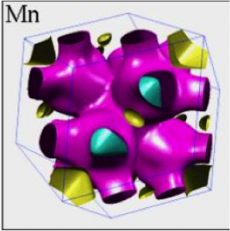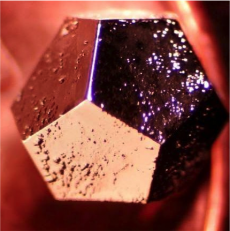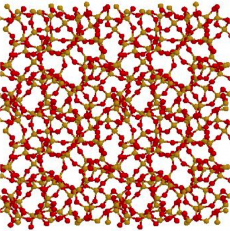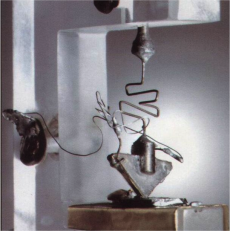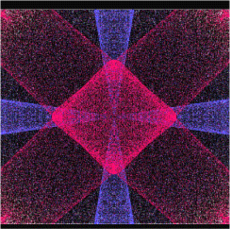Condensed Matter Theory
Übungsgruppen
- Gruppe 02 (Kai Arnold)
9 Teilnehmer/innen
Philos.-weg 19 / SR, Mo 11:15 - 13:00 - Gruppe Hav (Giacomo Bighin)
20 Teilnehmer/innen
Philos.-weg 19 / SR, Mo 9:15 - 11:00
Lecture content
- The Drude Theory of Metals
- The Sommerfeld Theory of Metals
- Electrons in a periodic potential
- Tight binding
- Band-structure, Fermi-surface, Density of states, Metals, Insulators, Semiconductors
- Semiconductor physics
- Surface states
- Phonons and disorder
- Relativistic corrections - spin-orbit coupling
- Phase transitions and topology
- Response functions
- Second quantization
- Green's functions (on an independent particle level)
- Self energy (for surface states and disorder)
Levels of theory discussed will be
- Mean-field theory
- Hartree-Fock
- Density functional theory
Recommended literature
-
Ashcroft / Mermin
Solid State Physics -
Kittel
Introduction to Solid State Physics -
Mattuck
A guide to Feynman Diagrams in the Many-Body Problem -
E.N. Economou
Green's Functions in Quantum Physics -
MajlisThe Quantum Theory of Magnetism
-
Haken / WolfThe Physics of Atoms and Quanta
The lecture script and videos are available on Moodle.
If you find errors in the script, please report them to me. The script will be updated regularly, but don't expect major changes. The script is quite extensive, and explicitly goes through the calculation of several examples. I will discuss in the lecture where to focus on.
You can find videos of the lecture content on youtube
Material discussed
| 18.10.2021 - 22.10.2021 |
Chapter 1 and 2 plus appendix A of the script. Chapter 1 + appendix A: Introduction and repetition of Quantum mechanics and second quantisation. The Hamiltonian of interest for condensed matter systems. Complexity of many electron system and emergent behaviour. Chapter 2: Drude model, Scattering length, Ohms law and Specific Heat |
| 25.10.2021-29.10.2021 | Chapter 3 of the script. Sommerfeld model, Fermi surface, band-structure or energy momentum dispersion and density of states. Solution to the specific heat problem in the Drude model. Scattering time and the probelm of near scattering length: Why do atomic nuclei in a periodic lattice appearently not scatter electrons ? |
| 1.11.2021 - 5.11.2021 | Chapter 4 (and appendix B) of the script. Periodic potentials, Bloch states, Bloch's theorm, crystal momentum. (Real and reciprocal lattice vectors) -- I assume this chapter is a repetition of lectures you heard before |
| 8.11.2021 - 12.11.2021 | Chapter 5 of the script. Mean-field methods. A short overview of different mean-field theories used to obtain effective potentials from interacting Hamiltonians |
| 15.11.2021 - 19.11.2021 | Chapter 6 of the script. Tight binding theory. Dual nature of Tight binding model and free electron model. Sign of hopping integrals, angular dependence of hopping integrals. Tight binding description of free electron bands. |
| 22.11.2021 - 26.11.2021 | Chapter 6 and 7 of the script. Wannier functions, band character and partial density of states + Definitions of Green's functions frequency and time doman and relation to band-structure. |
| 29.11.2021 - 3.12.2021 | Chapter 7 of the script. Green's functions. Impurity scattering - Become fluent in working with Green's functions. |
| 6.12.2021 - 10.12.2021 | Finish chapter 7. Videos 7.7 to 7.12 (https://www.youtube.com/playlist?list=PLhOEg5oWOoSXlUI4Lk6PtFpAjoPTxW2wQ) Meeting for questions - Friday via Zoom |
| 13.12.2021 - 17.12.2021 | Chapter 8 of the script. Self energy due to disorder. Video 8.1 https://www.youtube.com/playlist?list=PLhOEg5oWOoSVn-mQz5U-e6N_3_dIXySd1 Meeting on Friday via Zoom |
| 20.12.2021 - 24.12.2021 | Only tutorials |
| 10.01.2022 - 15.01.2022 | Chapter 9 of the script, Surface states |
| 17.01.2022 - 22.01.2022 | Chapter 10 of the script, Relativisitc effect. (Single lecture, no part of the exam). Chapter 11 of the script, Phase transitions. |
| 24.01.2022 - 29.01.2022 | Chapter 11 - Topological states and surface states - Chapter 12 - Response theory |
| 31.01.2022 - 04.02.2022 | Chapter 12 - Response theory |
For questions outside the lecture period you can find us on Rocket Chat: https://uebungen.physik.uni-heidelberg.de/chat
- Monday, from 9:15 to 11:00 tutorials in Philos.-weg 19 / SR.
- Wednesday from 9:15 to 11:00 lecture in Philos.-weg 19 / SR.
- Friday from 9:15 to 11:00 lecture INF 227 / HS 2.
- First lecture on Monday the 18-th of October
- No lecture on Wednesday the 20-th of October
- First homework due on Friday the 5-th of November, discussed on Monday the 8-th of November




